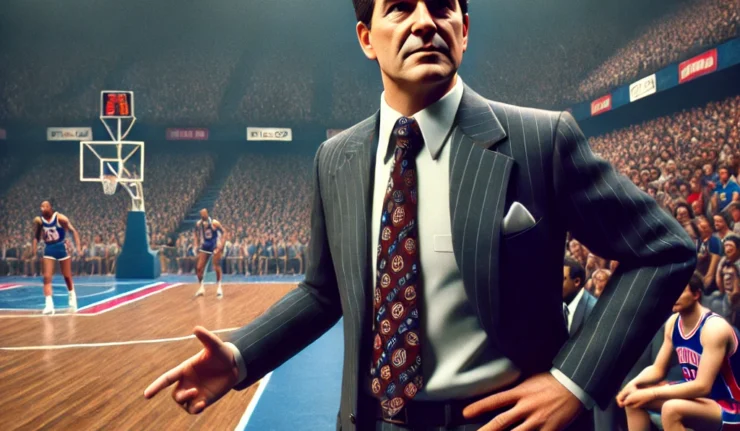The modern era of the NBA, generally considered to have begun with the league’s surge in popularity in the 1980s, has produced no shortage of iconic coaches. From tacticians and motivators to program builders and defensive architects, these leaders shaped not only teams, but entire eras of basketball. While Phil Jackson and Gregg Popovich receive the lion’s share of acclaim—and justifiably so—one name deserves the top spot for reasons beyond rings and win-loss records: Chuck Daly.
1. Chuck Daly
Daly was not merely a head coach—he was a cultural translator, a psychological strategist, and perhaps the greatest manager of personalities the league has ever seen. When Daly took over the Detroit Pistons in 1983, they were a franchise adrift. Within six seasons, he transformed them into one of the most disciplined and feared dynasties in league history. His Pistons teams won back-to-back titles in 1989 and 1990, not by overwhelming talent, but through precision, trust, and the iron bond of a team culture defined by sacrifice.
What set Daly apart was his ability to convince volatile personalities—Isiah Thomas, Bill Laimbeer, Dennis Rodman, Rick Mahorn—to operate with total buy-in. He mastered the rhythm of ego management without ever capitulating to it. His command during the “Bad Boys” era is perhaps the greatest example in NBA history of team cohesion outperforming individual firepower. He was also the only man entrusted to coach the 1992 U.S. Olympic “Dream Team,” and, tellingly, the only figure on that roster who never needed to raise his voice to command respect.
Daly’s Pistons were 3-1 against Jordan and the Bulls in the postseason, and perhaps that’s the best credentials for this coach as the greatest mastermind to ever roam the sidelines.
Daly’s greatness didn’t depend on a transcendent superstar like Michael Jordan or LeBron James. It was grounded in principles: accountability, defense, discipline, and the radical idea that championships are won with the seventh man just as much as with the first.
2. Gregg Popovich
Popovich’s longevity with the San Antonio Spurs is remarkable, but his true brilliance lies in adaptability. From the Duncan-Robinson low-post era, to the elegant ball movement of the 2014 team, to the player development approach with international and late-draft players, Popovich has consistently remained ahead of the curve.
Popovich’s coaching tree is as impressive as his resume. Nearly a dozen current and former NBA head coaches served under him. His system prizes intelligence and unselfishness, but it was his willingness to evolve—phasing out the grind-it-out style for a fluid offense—that elevated his status from great to transcendent.
3. Phil Jackson
Jackson’s record 11 championships are often cited as proof of his supremacy. But statistics miss the nuance. Jackson’s genius was his ability to operate in the psychological realm. His use of Zen Buddhism, Native American philosophy, and Jungian psychology were not gimmicks—they were methods of diffusing tension in locker rooms filled with alpha competitors.
His Triangle Offense, co-developed with Tex Winter, was less about plays and more about principles. Jackson made his teams think, and he insisted that stardom and structure co-exist. His real success was not with Jordan or Kobe individually, but in convincing those figures to trust their teammates in the final moments.
4. Pat Riley
Riley’s career straddles two distinct eras. He was the slick-haired face of 1980s Showtime in Los Angeles, commanding Magic Johnson’s Lakers to four titles with up-tempo offense and transitional brilliance. But in the 1990s, he rebranded himself in New York, creating a defensive bruiser of a Knicks team that nearly upended Jordan’s dynasty.
Few coaches have changed their identity so effectively. When he later took the reins in Miami as an executive, he returned to coaching briefly and delivered another title in 2006. Riley’s enduring gift is his ability to diagnose team psychology and inject edge without losing control.
5. Erik Spoelstra
Spoelstra is sometimes dismissed as the man who happened to be in charge when LeBron James joined forces with Dwyane Wade and Chris Bosh. That ignores the deep well of tactical knowledge and emotional intelligence he brought to the Heat organization.
After surviving the crucible of the LeBron years, Spoelstra has arguably done his best work since—guiding underdog rosters to deep playoff runs, including two NBA Finals appearances in the 2020 and 2023 postseasons. His Heat teams are emblematic of conditioning, spacing, and strategic flexibility. Spoelstra doesn’t need stars to win—he needs players who will buy in.
Each coach on this list reflects a different face of NBA excellence. But Daly stands alone as the architect of a cultural shift in how teams defend, how stars are molded, and how chemistry is forged. His Pistons didn’t just win—they imposed a new way of thinking about winning. While others may have more rings, Daly’s legacy is the foundation upon which many of them stand.


